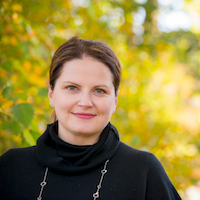The false dichotomy of the title that so infuriates me is the idea that you can be either accessible and engaging or accurate and scientific—but not both. It was a Science Friday interview with Hope Jahren, author of Lab Girl that occasioned my furor, as described in part 1 and part 2.
She isn’t the only offender, of course. Her interview reminded me of an absolutely insufferable TED Talk I saw years ago, in which a middle school teacher, Tyler DeWitt (and this kills me, because I love teachers!), complained of how “the tyranny of precision” is killing science education. The example he discussed had to do with viral replication (which is not in any state standards at the middle school level as far as I know).
DeWitt, to his credit, wants to be accessible. He advocates telling a story, about how viruses smuggle themselves into bacteria, in order to engage learners—a great idea! But he is leery of the call to be accurate. He wants to say, “viruses make copies of themselves by slipping their DNA into a bacterium,” but he complains that his critics  (including me!) object that not all viruses have DNA—some have RNA. They would, he says, prefer him to say, “Bacteriophage replication is initiated through the introduction of viral nucleic acid into a bacterium”—a clearly ridiculous and thoroughly inaccessible way of describing something to middle school students.
(including me!) object that not all viruses have DNA—some have RNA. They would, he says, prefer him to say, “Bacteriophage replication is initiated through the introduction of viral nucleic acid into a bacterium”—a clearly ridiculous and thoroughly inaccessible way of describing something to middle school students.
But a moment’s thought shows how he could combine accessibility and accuracy: “viruses make copies of themselves by slipping their genetic material into a bacterium.” There. DeWitt can tell the story that he wants to tell, he can avoid the absurd jargon, and yet he can get it right and not worry about having oversimplified the story to the point of error.
And the same is true with Jahren. Here’s the actual sentence from her book that she cited as being a magnet for scientific criticism: “Plants are the only things in the universe that can make sugar out of nonliving inorganic matter” (page 64). Let’s help her continue the paragraph, Maybe something like,
Now, I’m using “plants” loosely here. What we tend to think of as plants—flowers, bushes, grasses, and trees—aren’t the only organisms that can make the inorganic organic. There are microscopic algae in the ocean that can do the same thing, for example (in fact, without them, no ocean life would be possible!). These remarkable organisms are all known as ‘autotrophs’ because they can feed (“troph”) themselves (“auto”). I’m showing my own biases by lumping all autotrophs together as “plants” because my research is on plants—big, glorious organisms that have industriously made their way across every continent and into practically every ecosystem.
Wouldn’t that work?
(Nitpicker extraordinaire Glenn Branch wants to go on the record as insisting that there are abiotic producers of sugar, since a simple sugar—glycolaldehyde—was identified in comet Lovejoy last year. And comets, he sententiously adds, are not, as far as is known, plants. Jahren is lucky not to have him as a colleague. I however couldn't be more delighted.)
For the record, I reached out to Jahren on Twitter, saying (in a series of Tweets):
@HopeJahren I listened to your @scifri segment just now and have a couple of Qs... with regards to using “plants” as shorthand for autotrophs, you made it seem like you can be accessible OR accurate—but surely you can be both? Autotrophs are an elementary school concept. Surely you could use your gift of language to jog their memories?
She didn’t Tweet back, which was disappointing. So what can we do? I choose to try to set a good example, endeavoring to write and talk about science accurately and accessibly. Sadly, I don’t have a Science Friday or TED Talk platform to explain the dangers of the infuriating false dichotomy between accessibility and accuracy in science communication, but I do have this blog! So be sure to tell me when anybody—and that includes me!—falls under its annoying spell.
Are you a teacher and want to tell us about an amazing free resource? Do you have an idea for a Misconception Monday or other type of post? Have a fossil to share? See some good or bad examples of science communication lately? Drop me an email or shoot me a Tweet @keeps3.

